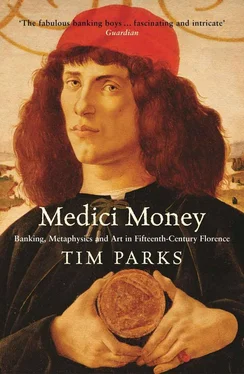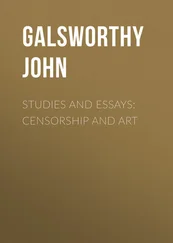There were those in the government who felt that extending the tax was not a bad idea. The Florentines had a flair for bureaucracy, which is why we now have so many records of the city’s history. So the process of bringing all the outlying towns into the tax register began. In protest, an eighteen-man delegation arrived from the small subject town of Volterra. We can’t pay, they complain. They are arrested. On release, one of the men returns to Volterra and starts a rebellion. Niccolò Fortebraccio, a now out-of-work condottiere , is engaged to go and sort things out. Before he and his mercenaries arrive, the Volterrans have already rebelled against the rebels and the town is in Florentine hands again. But Fortebraccio doesn’t want to be unemployed. In November 1429, he marches into the territory of Lucca northwest of Florence and, acting on his own initiative, captures a couple of small citadels. Suddenly, the Florentines are unanimous in deciding that the capture of Lucca is absolutely indispensable. Wealthy Lucca will be their compensation for the disasters of the previous seven years. As always when there is a war, the city forms a ten-man committee to decide military strategy, the so-called Ten of War. Now undisputed head of the Medici clan, Cosimo is on it.
A cloud of ambiguity hangs over these crucial years that bring Cosimo to power. But then a cloud hangs over everything to do with him: the bank, his patronage of the arts, his relationship with slaves, his foreign policy. When Rinaldo degli Albizzi proposed that the other patrician families get rid of him, the now-decrepit Uzzano is reported by Machiavelli to have pointed out how difficult this would be: “The deeds of Cosimo that make us suspect him are these: he helps everyone with his money, and not only private individuals, but the state, and not only Florentines, but the condottieri; he favors this or that citizen who has need of the magistrates; by the good will that he has in the generality of people he pulls this or that friend to higher ranks of honor.”
Did Uzzano really say these words? Commissioned to write the Florentine Histories for a later Medici and a grand duke at that, Machiavelli admitted in a letter to a friend that he couldn’t honestly say “by what means and tricks one [Cosimo] arrives at so great a height.” Hence: “That which I don’t want to say myself, as coming from me, I will make his [Cosimo’s] adversaries say.” And he makes Uzzano conclude: “So we will have to allege as the causes for driving him out that he is merciful, helpful, liberal, and loved by everyone.” In a cash-starved town, Cosimo had for some years now been using his wealth to gather political consensus. To what end?
“It is hard for the rich to live in Florence, unless they rule the state.” Such would be the comment of Lorenzo il Magnifico , Cosimo’s grandson. And the implication was, if you don’t control the state, the state will ruin you. You will become the object of punitive taxation deliberately aimed at confiscating your fortune. But was this just an excuse? Would it have been possible for the Medici to run a spectacularly profitable bank and to stay out of government? In Rome or Milan, perhaps it would. One can become only so powerful in the shadow of a despot. Insist on a loan repayment from a prince and he arrests you. A pope excommunicates you. Even in republican Venice, the doge was elected for life and that was that. You couldn’t take his place, so you could hardly be feared either.
But Florence worked like this: To prevent anyone from ever becoming a tyrant, a new government of eight priors plus one gonfaloniere della giustizia was elected every two months . To prevent divisive election campaigns on party lines, the names of possible priors — men who met certain restrictive financial and family criteria — were written on tags and placed in a series of leather bags representing different quarters of the town and different guilds. Then nine names were selected at random , two priors for each of the four quarters of town, six from the seven richer guilds, two from the fourteen artisans’ guilds, and one man, always from the richer guilds, to be gonfaloniere della giustizia , the head of government. That is, in order that no single man might rule, everyone must rule, or at least everyone in the wealthiest classes, but briefly . It was an idealistic solution but hardly practical when it came to deciding policies for the long term.
For two months, nine men who perhaps didn’t agree with each other and were no doubt concerned about abandoning their businesses for so long were obliged to live together (waited on hand and foot) in the Palazzo della Signoria and run the town. They were not allowed to leave their posts. The ruler must be seen to be a public servant. This was the spirit of the constitution. But temporary and unprepared as these men inevitably were — who knew I was going to be elected prior until just a week ago? — the person whom they tended to serve was the leader of whichever family and faction was dominant.
Not completely, though. Not slavishly. It was delicate, this mechanism. Anything could tip the balance, especially now that some people had begun to sense the end of an era at hand, to see the Medici as an alternative to the Albizzi. So with each new signoria , some priors might be obeying one camp, some the other. True, the Albizzi family had been running the city very successfully for decades, but thanks to the debts run up in the war against Milan, things were now going seriously wrong. People were unhappy. A power struggle was in the cards. Perhaps the Medici could have kept out of it, but the vastness of their fortune attracted constant attention. Democracy depends on consensus, consensus on persuasion. And what is more persuasive than money? A dramatically successful banker doesn’t even have to open his mouth before people come running. If you give me a little more time to repay this loan, I’ll support you when I’m on the signoria . If you give my son a job, I’ll have a word with the priors about your tax problem. Perhaps this is what lies at the heart of our dislike of banking wealth. We are afraid we can be bought. We are sure others already have been, and that many can’t wait to be. Despite all the taxation and forced loans, Medici wealth continues to grow. Perhaps growth for a bank means growth into politics. A clash between the Medici and the Albizzi seems inevitable. The war committee, with Cosimo sitting, appoints Rinaldo degli Albizzi as war commissioner — the political figure, that is, who follows the city’s condottiere on his campaigns. The boss will be out of town. The Medici camp will take every opportunity to slander him in his absence.
Everything goes wrong. Plundering the countryside around Lucca to starve the town, the mercenaries behave with extreme cruelty. The citizens of Seravezza come to Florence to complain: Despite surrendering, we’ve seen our churches sacked, our daughters raped. Rinaldo, who hadn’t been in Seravezza at the time, is accused. He is only involved in the war for his profit, someone says. This is Medici talk. Furious, Rinaldo abandons his post without orders. The architect Brunelleschi takes time out from building the dome over the duomo to try to flood out Lucca by diverting the river Serchio. The Lucchesi build a dike to block the water; then, one night, they break the ditch that the Florentines have built and flood out the plain where they are camped. Touché!
Inevitably, Lucca’s despotic signore , Pagolo Guinigi, sends an SOS to Duke Visconti in Milan, who dispatches Count Francesco Sforza, star condottiere of all time. Alarmed, the Florentines buy him off. Sforza refuses actually to change sides and actually attack Lucca for Florence — That would be a blot on my honor, he says — but for 50,000 Venetian ducats (perhaps 55,000 florins) he agrees not to defend the town. How can you fight a war without bankers? To sweeten the pill of this treachery for the Lucchesi, Sforza gives them a hand to dump the tyrant Guinigi and turn republican. Now they’re even more eager to defend themselves. Now the republican Florentines will have to drop their pathetic rhetoric about having started this war as a fight against tyranny. It’s the city they want, the wealth.
Читать дальше












